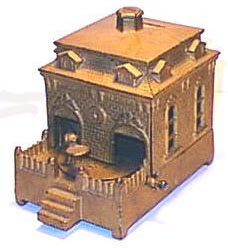
Dog on a Turntable Bank (above) operated by: placing a coin on a tray & turning the handle: "the dog then deposits the coin"
The Judd ancestry can be traced back to Deacon Thomas Judd who came from England and settled in Cambridge, MA in 1633/4.
Deacon Morton Judd, born in 1808, learned his trade in a brass foundry and then, established his own business in 1830. In 1833, Morton's brother, Oliver S., joined the company as partner and the name was changed to M & O.S. Judd. In 1853, Morton's eldest son, Albert, replaced Oliver S. as the business partner. And, the company's name was changed to M. Judd & Sons. In 1863, Albert purchased the business and sold it back to his uncle, Oliver S. In 1865, Morton and Albert formed their own company to manufacture "Builder's Hardware" in New Haven, CN. In 1870, the business evolved to the Judd Manufacturing Company when Edward, Oliver S.'s brother, became President.
In 1877, Morton and his three sons, Albert, Hubert L. & Edward, erected a plant in Wallingford, CN where they began a busness to manufacture Stationers' and Druggists' hardware. It was during this time that the company became well known for their still and mechanical banks. (The first mechanical bank had been introduced in 1869. This bank was known as "Hall's Excelsior" made by J.& E. Stevens.) Judd banks were usually finished in a brown or maroon lacquer and were washed in a green coloring.

Dog on a Turntable Bank (above) operated by: placing a coin on a tray & turning the handle: "the dog then deposits the coin"

Mosque bank
Not until the early 1910's, did the company start making
"Cast Iron " decorative products, such as,
The Judd Company was sold to the Stanley Works Company in1954.
CAT-- Hollow (Not Shown on Website)
BOY With HANDS In POCKETS
the MAID # 1242
the BELLHOP # 1244
POINTING PILGRIM BOY # 1245
BLACK MAN on COTTON BALE # 1248
MAJOR DUMO # 1249
DECO WOMAN #1251
FRENCH FRUIT BASKET # 1252
DAPPER DAN # 1254
DAPPER DAN # 1256
DUTCH GIRL #1255
CAT on CHIMNEY #1257
WHIMSICAL BOY # 1258
FLOWER BASKET # 1259
DOGWOOD BASKET # 1260
BOY in TUXEDO # 1262
The WEST WIND # 1263
MALLARD DUCK # 1265
JAPANESE SPANIEL # 1267
POINSETTIA # 1268
ROSE TRELLIS #1269
WOMAN HOLDING FLOWER BASKETS # 1270
CAT SCRATCH GIRL # 1271
PEASANT GIRL #1277
MINUET GIRL # 1278
WOMAN PERFORMING CURTSEY # 1279
COTTAGE # 1283
FLOWER BOWL # 1285
SNOWY OWL on STUMP # 1287
PARROT # 1289
LIGHTHOUSE # 1290
MARY QUITECONTRARY # 1292
SCHOONER SHIP # 1296
Many of their doorstops can be identified by their distinct dark Brown or dark Green color of their back sides .
This Brown/Green coatings was painted all over the doorstop before the painted colors were applied.
Since the painted colors on the frontside covered the brown/green overcoat, only visible the brown/green color was visible on the back.
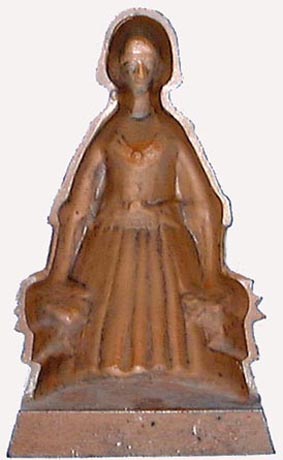
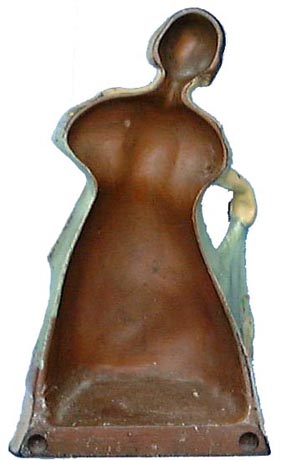
Judd sometimes placed a hole in the middle of the back. This hole held a wooden peg that tappered into a flat. The flat was to fit under the door.
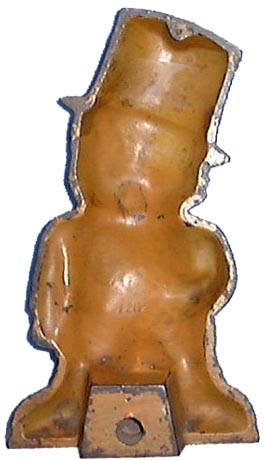
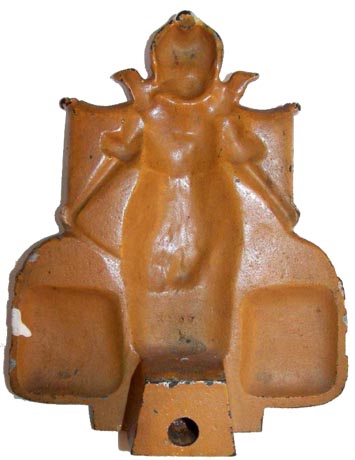
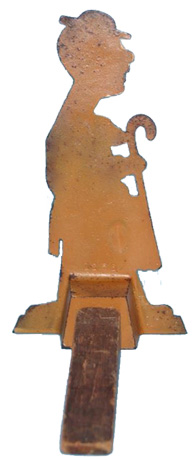
Their Number on back was usually
"
consisting of
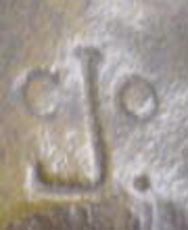
Sometimes, they also marked the letters --